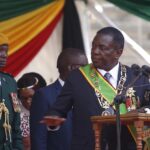CCC leader Nelson Chamisa faces deepening rift within party amidst leadership struggles
Nelson Chamisa, the leader of the Citizens Coalition for Change (CCC), appears to have left the party in a state of disarray as divisions among senior members continue to widen. This comes as ordinary members grow increasingly disillusioned with Chamisa’s leadership style, creating a rift within the party.
The fractures within the CCC became evident during the recent election of Harare mayor Jacob Mafume. Despite Chamisa’s directive to vote for Elvis Ruzani, councillors defied his orders, highlighting a lack of trust and cohesion within the party.
Confirming the internal divisions, CCC deputy spokesperson Gift “Ostallos” Siziba acknowledged that Ruzani had been selected as the next Harare mayor through the party’s internal process. However, the councillors expressed their dissatisfaction with Chamisa’s attempt to impose Ruzani as the choice.
In response, CCC spokesperson Promise Mkwananzi released a statement claiming that the election was not free and fair. He alleged that councillors were coerced into voting for Mafume in the presence of the police. However, Mafume countered the claims, releasing a video showing the councillors celebrating after the election without any police presence.
Chamisa has also faced criticism for allegedly neglecting the party’s candidates in the recently held and upcoming February 3, 2024 by-elections. The candidates have been left to campaign on their own without the support of their leader and are relying on personal resources due to their recalls from the party.
Sengezo Tshabangu, self-proclaimed CCC interim secretary-general, triggered the recalls of the party’s legislators and councillors, stating that they had ceased to be members. However, Chamisa has not shown solidarity with his former colleagues by going to court or filing supporting documents for their cause to be included on the ballot.
In recent weeks, Chamisa’s absence from scheduled events and rallies has further fueled speculation about internal disagreements within the party leadership. Supporters were disappointed when a rally in Chitungwiza was called off at the last minute due to Chamisa’s non-attendance. He also boycotted rallies held in Bulawayo the previous month.
While party officials downplayed the situation, attributing Chamisa’s absence to scheduling conflicts and a voluntary attendance policy, some CCC members expressed frustration and suspicion. The lack of a clear explanation for Chamisa’s actions has led to speculation about internal strife within the party.
Political analyst Romeo Chasara emphasized the need for Chamisa to address the concerns of disgruntled members who are growing increasingly disillusioned with his leadership style. Failure to tackle these issues head-on may lead to further divisions within the CCC, potentially jeopardizing Zimbabwe’s fragile democracy.
Chamisa is currently embroiled in a power struggle with his former vice-presidents, Tendai Biti and Welshman Ncube. Biti has accused Chamisa of creating fake social media accounts to attack him, while Ncube stated on social media that Chamisa sidelined them during the conception of the CCC last year.
Furthermore, social media trolls have accused Biti, Ncube, and Chalton Hwende of collaborating with Tshabangu to effect recalls, although they vehemently deny these allegations. Hwende has called on Chamisa to engage in dialogue with Biti and Ncube, but insiders suggest that Chamisa is resisting negotiations with his former allies, believing he can dictate the party’s direction singlehandedly.
Chamisa has also faced criticism for reportedly abandoning incarcerated former Zengeza West legislator Job Sikhala. Sikhala had to rely on teachers’ union leader Obert Masaraure to form a solidarity task force as he felt the CCC was not doing enough to support him.
Debates within the CCC have emerged regarding whether to withdraw from Parliament and local government in protest of the recalls. However, some legislators and councillors are opposed to this move after having invested their own resources into their campaigns.
In December of last year, CCC legislators defied Chamisa’s directive by accepting housing loans offered by the government, further underscoring the divisions within the party.
The future of the CCC hangs in the balance as Nelson Chamisa grapples with internal strife and mounting discontent among party members. The resolution of these issues will be crucial in determining the party’s unity and effectiveness in Zimbabwe’s political landscape.











